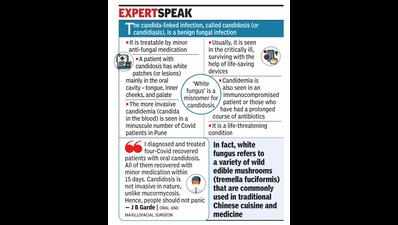Trending
This story is from May 22, 2021
‘Don’t call candida-linked infections white fungus’

Pune: White patches (lesions) on patients’ tongues, inner cheeks, and palates are caused by candidosis (also spelled candidiasis) — a benign fungal infection. Terming the condition “white fungus” is incorrect, and the misnomer only creates panic, experts from the national task force on Covid-19 said.
The infection (caused by fungus candida) is easily treatable with minor and inexpensive anti-fungal oral tablets.It does not require expensive injections, such liposomal amphotericin B — a key drug of choice in treating mucormycosis, an invasive fungal infection (caused by fungus mucor) currently on the rise mainly in Covid-recovered patients across the country
“‘White fungus’ for candidosis or any candida-linked infection is a complete misnomer. Doctors and media should refrain from using such incorrect terms as they only create panic among people,” said infectious disease expert Sanjay Pujari, a member of the national task force.
The term stems from white lesions/patches that candidiasis causes in patients. “A patient with candidosis has white patches or lesions mainly on the tongue, inner cheeks, and palate. Hence, a section of the media is calling it white fungus which is, in fact, incorrect and creates unnecessary panic,” he said.
Candida is part of normal flora on the skin, the oral gastro-intestinal and genito-urinary tracts in most individuals. “Oral candidosis (thrush) can be seen in any immunocompromised patients. It is benign and can be treated with local application of antifungals, or sometimes, tablets. Candida-associated infections are not very common among Covid patients the way mucormycosis is,” Pujari further said.
Treating doctors in Pune have reported sporadic cases of candidosis in the last 30 days. “I diagnosed and treated four-Covid recovered patients with oral candidosis. All of them recovered with minor medication within 15 days. Candidosis is not invasive in nature, unlike mucormycosis. Hence, people should not panic,” said oral and maxillofacial surgeon J B Garde.
Garde is involved in the diagnosis and treatment of post-Covid fungal infections at prominent hospitals in Pune, including Ruby Hall Clinic and Poona hospital.
Another oral surgeon Prasad Dadhe said, “I have seen only two or three cases of candidosis in Covid patients. Those diagnosed had uncontrolled diabetes. The infection settled with minor medication. Candidosis is not life-threatening, unlike mucormycosis.”
In extremely rare cases, candidosis spreads to vital organs including the lungs.
“However, we have not seen such among Covid patients so far,” said chest physician Mahavir Modi.
Candida in the bloodstream is called candidemia. It is often seen in critically ill patients. “We have registered around 40 cases of candida in the bloodstream in critically ill Covid patients ever since the pandemic broke out in March last year,” said infectious diseases expert Parikshit Prayag of Deenanath Mangeshkar hospital.
The infection (caused by fungus candida) is easily treatable with minor and inexpensive anti-fungal oral tablets.It does not require expensive injections, such liposomal amphotericin B — a key drug of choice in treating mucormycosis, an invasive fungal infection (caused by fungus mucor) currently on the rise mainly in Covid-recovered patients across the country
“‘White fungus’ for candidosis or any candida-linked infection is a complete misnomer. Doctors and media should refrain from using such incorrect terms as they only create panic among people,” said infectious disease expert Sanjay Pujari, a member of the national task force.
The term stems from white lesions/patches that candidiasis causes in patients. “A patient with candidosis has white patches or lesions mainly on the tongue, inner cheeks, and palate. Hence, a section of the media is calling it white fungus which is, in fact, incorrect and creates unnecessary panic,” he said.
In fact, white fungus is a variety of edible mushrooms (tremella fuciformis) used in traditional Chinese cuisine and medicine.
Candida is part of normal flora on the skin, the oral gastro-intestinal and genito-urinary tracts in most individuals. “Oral candidosis (thrush) can be seen in any immunocompromised patients. It is benign and can be treated with local application of antifungals, or sometimes, tablets. Candida-associated infections are not very common among Covid patients the way mucormycosis is,” Pujari further said.
Treating doctors in Pune have reported sporadic cases of candidosis in the last 30 days. “I diagnosed and treated four-Covid recovered patients with oral candidosis. All of them recovered with minor medication within 15 days. Candidosis is not invasive in nature, unlike mucormycosis. Hence, people should not panic,” said oral and maxillofacial surgeon J B Garde.
Garde is involved in the diagnosis and treatment of post-Covid fungal infections at prominent hospitals in Pune, including Ruby Hall Clinic and Poona hospital.
Another oral surgeon Prasad Dadhe said, “I have seen only two or three cases of candidosis in Covid patients. Those diagnosed had uncontrolled diabetes. The infection settled with minor medication. Candidosis is not life-threatening, unlike mucormycosis.”
In extremely rare cases, candidosis spreads to vital organs including the lungs.
“However, we have not seen such among Covid patients so far,” said chest physician Mahavir Modi.
Candida in the bloodstream is called candidemia. It is often seen in critically ill patients. “We have registered around 40 cases of candida in the bloodstream in critically ill Covid patients ever since the pandemic broke out in March last year,” said infectious diseases expert Parikshit Prayag of Deenanath Mangeshkar hospital.
End of Article
FOLLOW US ON SOCIAL MEDIA











